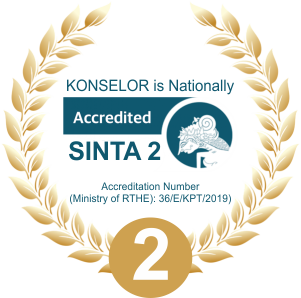Students’ perceptions of teachers’ beliefs and their effects on students’ achievement
 ), Refnaldi Refnaldi(2), Muhammad Kholis(3),
), Refnaldi Refnaldi(2), Muhammad Kholis(3), (1) Universitas Negeri Padang
(2) Universitas Negeri Padang
(3) Universitas Negeri Padang
 Corresponding Author
Corresponding Author
Copyright (c) 2020 M. Zaim
DOI : https://doi.org/10.24036/0202091106891-0-00
Full Text:
 Language : en
Language : en
Abstract
Keywords
References
Abdi, H., & Asadi, B. (2015). A Synopsis of Researches on Teachers' and Students' Beliefs about Language Learning. International Journal on Studies in English Language and Literature (IJSELL), 3(4), 104-114.
Bracken, S. (2007). Effective Teaching Strategies for Raising Academic Achievement of Low-income adolescents. 1-154.
Bruno, F. J. (2002). Psychology: A self-teaching guide. New Jersey: John Wiley & Sons, Inc.
Cordova, J. V. (2018). Teaching strategies of selected Filipino EFL teachers and its perceived effects to Thai students. Asian EFL Journal, 20(2), 125-141.
Doǧruer, N., Meneviş, I., & Eyyam, R. (2010). EFL Teachers' beliefs on learning English and their teaching styles. Procedia - Social and Behavioral Sciences, 3, 83-87. doi: 10.1016/j.sbspro.2010.07.015
El-Omari, A. H. (2016). Factors Affecting Students' Achievement in English Language Learning. Journal of Educational and Social Research, 6(2), 9-18. doi: 10.5901/jesr.2016.v6n2p9
Floris, F. (2013). Exploring Teachers Beliefs on the Teaching of English in English Language Courses in Indonesia. Philippine ESL Journal, 11(July), 4-24.
Gay, L. R., Mills, G. E., & Airasian, P. W. (2011). Educational research: Competencies for analysis and application (11th ed.). Boston: Person.
Georgiou, S. N., & Tourva, A. (2012). Teacher Attributions of Achievement: Stereotypes in the Classroom. Education and Society, 25(2), 73-86. doi: 10.7459/es/25.2.05
Hardré, P. L., Huang, S. H., Chen, C. H., Chiang, C. T., Jen, F. L., & Warden, L. (2006). High school teachers' motivational perceptions and strategies in an East Asian nation. Asia-Pacific Journal of Teacher Education, 34(2), 199-221. doi: 10.1080/13598660600720587
Hardré, P. L., & Sullivan, D. W. (2008). Teacher perceptions and individual differences: How they influence rural teachers' motivating strategies. Teaching and Teacher Education, 24(8), 2059-2075. doi: 10.1016/j.tate.2008.04.007
Harmer, J. (2007). The practice of English language teaching. New York: Longman.
Hidayat, I. (2007). Peranan Keyakinan Guru Terhadap Hakikat Dan Belajar Mengajar Sains Dalam Pengembangan Profesionalisme. Cakrawala Pendidikan, 1(1), 63-82. doi: 10.21831/cp.v1i1.8551
Hidayat, M. (2017). Teacher’s beliefs and practices on assessment at SMAN 2 Salatiga in academic year 2016/2017 (A case study at SMAN 2 Salatiga) (Thesis ed.). Surakarta: Universitas Muhammadiyah Surakarta.
Hornby, A. S. (1995). The advanced learner dictionary of current English (2nd ed.). London: Oxford University Press.
Horwitz, E. K. (1988). The Beliefs about Language Learning of Beginning University Foreign Language Students. The Modern Language Journal, 72(3), 283-294. doi: 10.1111/j.1540-4781.1988.tb04190.x
Hoy, W. A. (2000). Changes in teacher efficacy during the early years of teaching Orleans, LA (pp. 1-26). Washington: American Educational Research Association.
Kandilla, D. P., Pebriyani, F., Meliana, S. S., & Arbiansyah. (2018). Recalling student teacher;s beliefs on English language teaching: Evidence from a pre-service teaching program in Indonesia. Teaching & Learning English in Multicultural Context, 2(2), 63-69.
Kaplan, A., & Maehr, M. L. (2007). The contributions and prospects of goal orientation theory. Educational Psychology Review, 19(2), 141-184. doi: 10.1007/s10648-006-9012-5
Kuzborska, I. (2011). Links between teachers' beliefs and practices and research on reading. Reading in a foreign language, 23(1), 102-102.
Larenas, C. D., Hernandez, P. A., & Navarrete, M. O. (2015). A case study on efl teachers’ beliefs about the teaching and learning of english in public education. Porta Linguarum, 23(23), 171-186.
Marliani, R. (2010). Psikologi Perkembangan. Bandung: Pustaka Setia.
Mosha, M. A. (2014). Factors Affecting Students ’ Performance in English Language in Zanzibar Rural and Urban Secondary Schools. 5(35), 64-77.
Munoz, A. P. P. M., & Escobar, L. (2012). Teachers’ Beliefs About Assessment in an EFL Context in Colombia. Profile Issues in Teachers' Professional Development, 14(1), 143-158.
Olufemi, O. T., Adediran, A. A., & Oyediran, W. O. (2018). Factors affecting students’ academic performance in colleges of education in Southwest, Nigeria. British Journal of Education, 6(10), 43-56.
Pajares, M. F. (1992). Teachers' Beliefs and Educational Research: Cleaning Up a Messy Construct. Review of Educational Research, 62(3), 307-332. doi: 10.3102/00346543062003307
Parameswaran, E. G., & Beena, C. (2006). An invitation to psychology. New Delhi: Neelkamal Publications PVT. LTD.
Ren, H., & Bai, Y. (2016). A Study of the Relationship between Learning Belief and English Achievement of Chinese English Major College Students. Journal of Education and Practice, 7(14), 99-103.
Sari, M. E. Z. M. R. (2018). Authentic assessment for writing skills at junior high school. Advances in Social Science, Education and Humanities Research, 301, 205-212.
Sugiyono. (2017). Metode Penelitian Kuantitatif, Kualitatif, dan R & D. Bandung: Alfabeta.
Tavani, C., & Losh, S. (2003). Motivation, Self-Confidence, and Expectations as Predictors of the Academic Performances among Our High School Students. Child Study Journal, 33(3), 141-141.
Utami, D. N. (2016). the Efl Teachers’ Beliefs and Their Teaching Practices. OKARA: Jurnal Bahasa dan Sastra, 10(2), 135-135. doi: 10.19105/ojbs.v10i2.974
Wafa, Z. (2016). Teachers’ beliefs and their teaching practice. Surakarta: Universitas Muhammadiyah Surakarta.
Xu, L. (2012). The role of teachers' beliefs in the language teaching-learning process. Theory and Practice in Language Studies, 2(7), 1397-1402. doi: 10.4304/tpls.2.7.1397-1402
Zaim, M., Amri, Z., & Asri, F. R. (2018). Teachers' Practices in Using Authentic Assessment in Speaking at Grade IX of SMPN 12 Padang. 148(Icla 2017), 316-321. doi: 10.2991/icla-17.2018.54
Zaim, M., & Refnaldi. (2016). Teachers' need on authentic assessment for speaking skills. Proceeding International Seminar on Language and Arts (ISLA) 5.
Zheng, H. (2009). A Review of Research on EFL Pre-Service Teachers' Beliefs and Practices. Journal of Cambridge Studies, 4(1), 73-73. doi: 10.1080/0013188960380104
 Article Metrics
Article Metrics
 Abstract Views : 961 times
Abstract Views : 961 times
 PDF Downloaded : 164 times
PDF Downloaded : 164 times
Refbacks
- There are currently no refbacks.
Copyright (c) 2020 M. Zaim

This work is licensed under a Creative Commons Attribution 4.0 International License.







